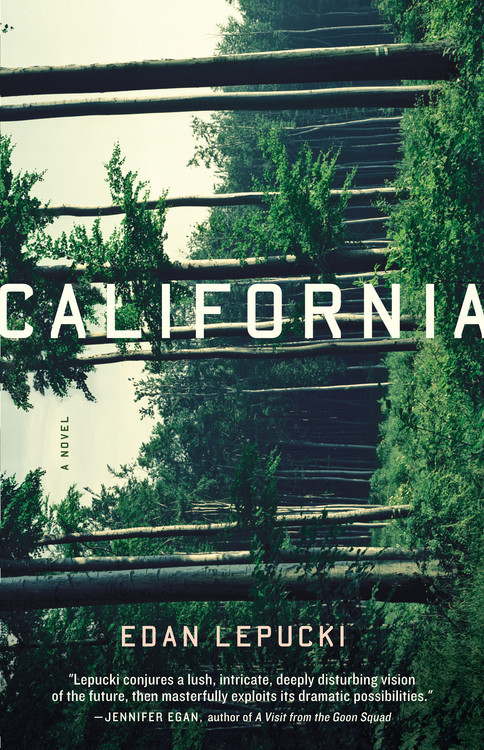#edan lepucki

California,Edan Lepucki’s debut novel, is a stunning tragedy set in a post-apocalyptic near future. There are no zombies, no aliens, no genetically mutated humans. The only monsters are us.
A young married couple, Cal and Frida, flees a decaying L.A. for the woods of California, in a desperate attempt to stay alive together. The United States is a desolate, crumbling shadow of its former self, due to increased natural disasters, rapidly dwindling resources, and a steadily swelling gap between the rich and poor. The world as we know it is releasing its final death rattles. The realism of this outcome is beyond unsettling. The novel sustains this uncanny, skin-crawling feeling until its final devastating moment. It lingered with me for several hours after. This is a testament to Lepucki’s masterful way with words; the writing is gorgeously, deceivingly plain.
The beginning of California finds Cal and Frida in almost-total isolation—their only outside contact is August, a reticent man who travels with his mule and cart to various isolated homesteads in the area, trading precious supplies. He urges them to stay put, to not ask questions. In these early moments we watch Cal and Frida eke out a life together while they mourn the world they’ve lost and use sex to pass the time. Their robust love glows in the dim, stark cabin that holds what little they still own.
This fragile existence is demolished when Frida gets pregnant. They don’t trust their ability to keep a child alive in this new world (especially after an early and pivotal tragedy that I won’t address because no spoilers), so when Frida accidentally discovers a nearby settlement, they strike out for it, despite previous warnings to avoid the area. Frida is determined to increase the safety of her unborn child, but Cal is more reluctant, being wary of the unknown. The paranoid community they find carries dark secrets and mysterious rules, and when they meet the leader, Cal and Frida’s cabin-life is set on fire. They know they can’t turn back now.
In this new society, called The Land, knowing what to do and who to trust becomes far more complicated than they anticipated. The best and worst aspects of humanity are dragged out in the open, forcing them (and us) to confront the depths of our treachery and vanity and the heights of our resilience and honor.
The evolution (or devolution) of Cal and Frida’s relationship is both compelling and frustrating. Their bond is affected by the mere presence of other people, with all those other human sounds and smells and personalities and fears. They have different roles to play and different distractions colonize their attention. Also, from the beginning Cal and Frida kept secrets from each other, but they get progressively worse after moving to The Land. Adversarial feelings flower between them. The love we saw in them earlier begins to transform, turning into something barbed and slightly poisonous.
Violence and death hang like a mist over the book, as Cal and Frida try, in their separate ways, to unravel the mysteries of The Land. As the story progresses to its climax, they form tenuous relationships with a few memorable residents, like Sailor, Anika, and Peter; and we gradually learn those dark secrets. Many of them are little individual cataclysms, hurtling Cal and Frida closer to the fork in their road.
[Spoiler Alert] I can’t resist addressing the chilling, somewhat open ending that seems to have divided readers. Personally, I thought it was brilliant. Even though it would have been entertaining to read how The Plan turned out, it’s unnecessary. It probably would’ve weakened the ending if Lepucki kept going to show us how it all turned out for Micah and Pines and The Land. If California was about the Group and the Communities and The Land, Cal and Frida wouldn’t be the main characters.
Pines possess a more familiar horror than The Land, which made the ending more unnerving for me. Cal and Frida are trapped in this profoundly elitist, sexist, and heteronormative shadow of a structure that is partially responsible for the apocalyptic landscape in the first place. Those who cannot remember the past are condemned to repeat it, after all.
The husband goes to work and the wife keeps house and they eat their beef wellington protein in their little boxes on the hillside and they pretend the wild, rotting “out there” isn’t there, just outside of their reinforced gates and security patrols. Her job was to not ask any questions. She and the child, they would stay here. Frida and Cal turning into Julie and Gray after surviving in the wilderness and living on The Land is so perfectly tragic that I’m getting queasy just thinking about it. [End Spoilers]
I am far from an expert on post-apocalyptic novels, but I believe this is a thoughtful and unique entry into the genre, peopled with flawed, distinctive characters, refreshing wit, and a provocative plot. Lepucki uses the dystopian setting to explore human fallibility, and how far we will go to preserve what love and safety we have in our lives. It definitely deservesthehype.
Review by Dawn West.
